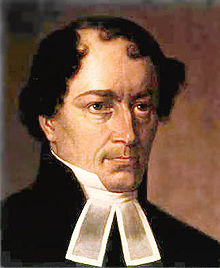| Ján Kollár | |
|---|---|
 | |
| Born | (1793-07-29)29 July 1793 Mosóc, Kingdom of Hungary (now Mošovce, Slovakia) |
| Died | 24 January 1852(1852-01-24) (aged 58) Vienna, Austrian Empire |
| Occupation | Writer, poet, pastor |
| Nationality | Slovak |
| Notable works | Slávy dcera |
| Relatives | Matej Kollár (father) Katarína Frndová (mother) |
Ján Kollár (Hungarian: Kollár János; 29 July 1793 – 24 January 1852) was a Slovak writer (mainly poet), archaeologist, scientist, Lutheran pastor, politician, and main ideologist of Pan-Slavism.
Life
He studied at the Lutheran Lyceum in Pressburg (Pozsony, Kingdom of Hungary, now Bratislava, Slovakia). In 1817 he enrolled in the University of Jena. His attendance at the Wartburgfest (18 October 1817) has since been credited as being a formative experience with regards to his views on Pan-Slavism.
He spent most of his adult life as a chaplain to the populous but poor Slovak Lutheran community in Pest (Kingdom of Hungary, today part of Budapest, Hungary). From 1849, he was a professor of Slavic archeology at the University of Vienna, and several times he also acted as a counselor to the Austrian government for issues around the Slovaks. He entered the Slovak national movement in its first phase.
His museum (since 1974) in Mošovce was installed in the former granary, which was the only masoned part of Kollár's otherwise wooden birth-house. The rest of the house burned down in a fire on 16 August 1863. In 2009 a replica was rebuilt of the original birth-house, which is now a museum.
Views
He worked out a conception of Slav reciprocity. He admitted 4 standard languages: Russian, Polish, Czechoslovak and Serbo-Croatian.
Works
Besides writing poetry he also wrote technical literature.
- Slávy Dcera (1824; The daughter of Sláva), collection of two (37 and 39 sonnets) cycles
In this work he worked out the conception of Slavic reciprocity. He expressed his feelings to a woman but this love had transformed to a love to his homeland. The main thematics of this work are: •love •patriotism
It is divided into 5 chapters and it has a foreword.
Předzpěv (Prelude)
The author expressed his fears that the Slovaks will disappear from the face of Europe like other Slavic tribes before. He asked the Slovaks to ask for help from the Russian nation.
1. Sála
This part contains love sonnets. Kollár glorifies his love Mína, depicting her as an ideal of a Slavic maid, the daughter of goddess Sláva.
2. Labe, Rén, Vltava
In these parts, the author takes us to places where Slavic tribes lived before. He is disappointed because these areas belong to foreign countries now.
3. Dunaj
The author arrives to Slovakia, disillusioned by the poverty of this area. He is highly disappointed and longs for death.
4. Léthé
5. Acheron
Mína becomes a fairy and takes the author to Slavic heaven and hell.
- O literární vzájemnosti mezi kmeny a nářečími slavskĭmi (Reciprocity Between the Various Tribes and Dialects of the Slavic Nation, edited and translated into English by Alexander Maxwell)
Legacy

- Guta (Gúta) is a town in southern Slovakia with a Hungarian majority. It was renamed "Kolárovo" in 1948.
- Streets in Stara Pazova, Kisač, Padina and Belgrade in Serbia are named in his honor.
- The gymnasium in Bački Petrovac (Serbia) bears his name.
Gallery
-
 Statue of Ján Kollár in Mošovce
Statue of Ján Kollár in Mošovce
-
 Birth-house of Ján Kollár in Mošovce
Birth-house of Ján Kollár in Mošovce
-
 Motto
Motto
-
 Museum of Ján Kollár in Mošovce
Museum of Ján Kollár in Mošovce
References
- Petro, Peter (1995). A History of Slovak Literature (1 ed.). Mcgill Queens's University Press. p. 66.
- Auty, Robert (1 January 1952). "Jan Kollár, 1793-1852". The Slavonic and East European Review. 31 (76): 74–91. JSTOR 4204405.
- Auty, Robert (1 January 1952). "Jan Kollár, 1793-1852". The Slavonic and East European Review. 31 (76): 74–91. JSTOR 4204405.
- Sayer, Derek (1 January 2000). The Coasts of Bohemia: A Czech History. Princeton University Press. ISBN 069105052X.
- Petro, Peter (13 May 1997). History of Slovak Literature. McGill-Queen's Press - MQUP. ISBN 9780773514027.
- "Múzeum Jána Kollára Mošovce /* Jan Kollar Museum Mosovce /Muzeum.SK - múzeum, galéria, hrad, zámok/". www.muzeum.sk. Archived from the original on 1 February 2014. Retrieved 9 April 2016.
- "Reciprocity Between the Various Tribes and Dialects of the Slavic Nation | Slavica Publishers".
External links
- AUTY, R. Ján Kollár, 1793–1852. The Slavonic and East European Review, Vol. 31 (1952), No. 76: 74–91.
- KARÁSEK, J. Kollárova dobrozdání a nástin životopisný z roku 1849. V Praze: Česká akademie císaře Františka Josefa pro vědy, slovesnost an umění, 1903. 113 p. - available at ULB's Digital Library
- Works by Ján Kollár at Open Library

- Ján Kollár at Find a Grave
- 1793 births
- 1852 deaths
- People from Turčianske Teplice District
- People from the Kingdom of Hungary
- Slovak Lutherans
- Slovak poets
- Czech poets
- Czech male poets
- Slovak scientists
- Slovak politicians
- Slovak philologists
- Linguists from Slovakia
- Slovak philosophers
- Mošovce
- 19th-century poets
- 19th-century male writers
- 19th-century Lutheran clergy
- Burials at Olšany Cemetery